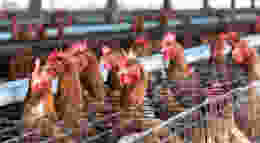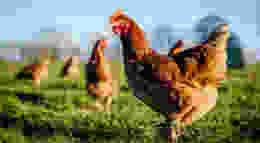
Boost societal understanding to boost animal welfare
Tonight I deliver the second RSPCA Wilberforce Lecture in London on the eve of the 200th anniversary of this historic charity, founded by anti-slavery campaigner William Wilberforce.
I’ll be talking about how we, as humans, have a ‘superpower’, giving us the ability to see and feel the world through the eyes of others. Empathy moves and enables us to treat animals with kindness. At the same time, however, we can switch off those emotions leading us to be cruel to those same animals - and people.
The RSPCA's Animal Kindness Index finds that almost seven in ten of us claim to be animal lovers. Animal welfare is the most popular charitable cause in the UK - and yet, the choices we make as consumers and citizens often result in great cruelty to animals, and on a massive scale. How can we understand this paradox? And what can we do about it?
Built into our humanity is a tendency to ‘humanise’ animals and even objects (a process known as anthropomorphism). We’ve seen this in the evolution of the teddy bear, which gradually moved over 100 years from looking like a bear, to today looking more like a human baby - big eyes, big head relative to body, and short nose. We do the same with inanimate objects, whether consciously or not: no one wants to buy a car with a ‘grumpy face’ - buyers prefer ‘happy cars’ with upturned grills that form a smile.
But this humanisation can cause harm. Society is breeding dogs, cats and rabbits that can't breathe properly to satisfy a humanised perception of “cuteness”. Popularity of these poor animals has soared. RSPCA research has found people buy flat-faced pets even though they know they can't breathe properly - because they find their snoring cute, or feel they would be able to tell if they were in pain. At the other end of the scale, swap "cuteness" for "toughness", and a similar thing happens with those who choose to import dogs with cropped ears.
Evolution has also bestowed on us an ability to turn off our empathy, and display kindness selectively. We see rival groups as less-human ‘others’. We tune out messages and stories that don’t fit with our mental model of ‘us’ as the good guys. Similarly, we’re a nation of animal lovers, but don’t want to look too closely at our treatment of farm animals. These processes operate fast, and often unconsciously.
We care about animals. Yet we consume them and their products in massive numbers, on industrialised farms, often reared to low standards, in a mission to produce as much meat as cheaply as possible. We breed chickens that can’t walk properly because they have grown so fast they cannot support their own weight. We often choose food based on price rather than ethical treatment - and in a cost of living crisis, it’s understandable.

So while we humanise the animals we share our homes with, we dehumanise - and detach from - the animals we put on our plates.
But while cruelty can be contagious, so can empathy. Studies have shown that people will sacrifice money to reduce a stranger’s pain. But in the case of animals our markets and institutions shield us from pain. Greenwashed images of rolling hills and happy livestock adorn all our meat - regardless of welfare standards.
Governments can play a key role in enabling us to make choices more consistent with our moral sentiments. The UK Government recently abandoned a consultation on reforming food labelling. This could have offered more information to consumers about how the food we eat is produced (and help drive reformulation of food to be healthier too).
Consider eggs. The UK Government’s ban on battery cages, and the subsequent introduction of method of production labels, enabled people to factor in how they were produced. This boosted production of free range and higher welfare eggs from around 20% to over 60%, and pushed many producers away from using still legal cage systems.
And it's not just food. Overseas, the Norwegian Supreme Court recently upheld the country’s ban on breeding the King Charles Spaniel as their welfare is so seriously compromised that breeding these dogs falls foul of animal cruelty laws.
Reviving such policies - either by government or by ethical business practice - to inform people’s choices is an important practical way of living up to Wilberforce’s famous challenge to us all: “You may choose to look the other way but you can never again say you did not know”.
Better food labelling, ending the import of dogs with cropped ears, tighter puppy breeding rules around flat-faced dogs - and even kinder AI - are the sorts of policies that could be a stimulus for wider societal understanding about how we can be consistently kind to our fellow creatures.
Behavioural science can inform better policy. More importantly, it informs us about ourselves. Wilberforce as his fellow campaigners recognised that slavery and abuse not only horribly harmed those affected, but also subtly harmed and reshaped society and perpetrators too. Wilberforce is as relevant today as he ever was. It is for us all to shape the society, and choices, that in turn shape us.

Professor David Halpern is Chief Executive of the Behavioural Insights Team, a spin out from the Cabinet Office.














